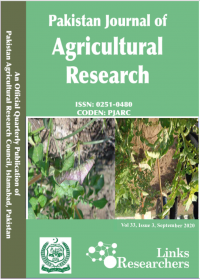Food Safety Present Scenario: A Road Map of Pakistan
Food Safety Present Scenario: A Road Map of Pakistan
Muhammad Suhail Ibrahim1*, Asif Ahmad1, Anwaar Ahmed1, Amer Mumtaz2, Muhammad Javaid Asad3, Saqib Jabbar2, Ahmad Mujtaba1 and Muhammad Nadeem4
ABSTRACT
Food safety refers to the potentially hazardous agents or contaminants present in food that can cause food-borne illness. These extraneous agents are causing morbidity and mortality. Contamination of food by various agents includes physical, chemical, and microbiological. Food safety ensures that what we eat, chew, or drink is safe for human health. The whole food chain should be monitored right from production to consumption. The public health burden of developing countries is increasing beyond their resources. In developing countries like Pakistan, food safety issues result in serious health issues. Diarrhea is perhaps the most important problem that is responsible for more than half of the global burden of food borne diseases, causing 550 million people to fall ill and 230,000 deaths every year. Children are at particular risk of food borne diarrheal diseases, with 220 million falling ill and 96000 dying every year. There is a persistent rise in the health expenditure of Pakistan. Pakistan is spending 0.5 to 0.8% of its GDP. Total health expenditure during 2016-17 remains at 145.97 billion showing an increase of 9 percent over the last year. Pakistan has dire need of revamping the food safety policy and infrastructure. Food being an important intake is a major source of human exposure. Finally, risk of unsafe communication is required for management and prevention of consumer-based food borne illness, most prevailing illness. We ignore food safety challenges at our peril as potential consequences of a lapse are huge; keeping the food supply safe is a never-ending task.
To share on other social networks, click on any share button. What are these?







